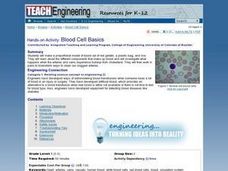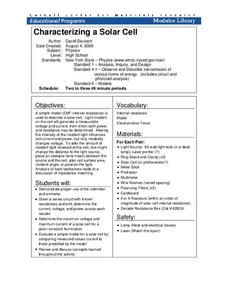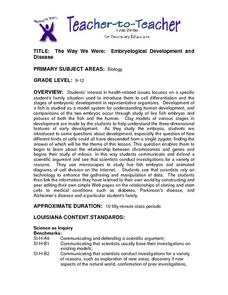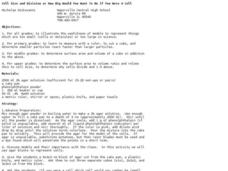Curated OER
Cell Size and Shape; Diffusion and Osmosis Processes
Use salmon eggs as a cell model for demonstrating the movement of water over concentration gradients. Junior scientists examine the same process microscopically with an onion cell. They use a thistle tube and a semipermeable membrane to...
Curated OER
Investigating Factors That Affect Cell Membrane Permeability
Cell membranes and the factors that affect its integrity are studied, with Beet tissue used as the model. A poster to display findings of the permeability of the membranes would clarify understanding and also allow a layer of language...
Colorado State University
What Is a "Model"?
Model the transfer of energy during a typical 24-hour period. Young scholars use a game-like approach to learning the patterns of heat transfer through the day and night. Groups of four exchange different tokens as the energy...
Curated OER
Cell Biology
Identify the different cell organelles in prokaryotes. Modelling the cells using Jell-o and candies will be a fun way to experience the cell in a hands-on way (different to using play-doh!). They observe cells under a microscope and draw...
Curated OER
Blood Cell Basics
Students design a proportional model of blood out of red gelatin, a plastic bag, and rice. They study the components that make up blood and investigate what happens when the arteries in different scenerios. They work in pairs in order to...
Cornell University
Build a Fuel Cell
Discover the connection between redox reactions and fuel cells. Collaborative groups build a Hoffmann Apparatus that demonstrates the electrolysis of water and then convert their models into a fuel cell. They use their fuel cells to...
Serendip
Structure and Function of Cells, Organs and Organ Systems
Cells of different organs have unique cell functions. Learn how cell functions vary depending on their roles in the body using an inquiry-based activity. Scholars analyze the cell structure to make comparisons to its functions, allowing...
Curated OER
Journey to the Center of a Cell
Ninth graders create a large scale model of a eukaryotic cell. In this biology lesson, 9th graders identify the different parts and function of the cells by using a robot to navigate through the cell models. They create a video tutorial...
Curated OER
Bread Cells
Fifth graders examine plant and animal cells. In this plant and animal cell lesson, 5th graders define what cells are, label their parts, and describe how plant and animal cells are different. They observe cells at a number of web sites,...
Curated OER
Biology: Cells and Chemical Changes
Students explore the numerous functions of cells in both plants and animals. Following a pre-assessment, they construct cell models and examine onion cell slides stained with iodine or dye. After participating in experiments on how to...
Curated OER
Color-Changing Cells
Students gather information about photoperiodism and senescence. They visually represent their comprehension about these processes in a 3-dimensional model. Students graphically distinguish between colors in a key.
Cornell University
Characterizing a Solar Cell
Young classes are sure to get a charge out of this lesson! Learners experiment with circuits of a solar cell. They practice determining current, voltage, and power for the circuit and maximize the voltage and current of the cell.
LABScI
Cell Diffusion and Permeability: The See-Thru Egg Lab
Create a model to study a microscopic phenomenon. The seventh of 12 lessons uses an egg (without its shell) to represent a cell membrane. Using different solutions, learners explore the concept of cell diffusion. They monitor...
Curated OER
How Mutations Lead to Changes in Cell Structure and Function
Students investigate how mutations lead to changes in cell structure and function. They construct an oligonucleotide, identify a protein sequence, design a step-by-step mechanism of how they think cells repair damaged DNA, and prepare...
MENSA Education & Research Foundation
The Cell: the Building Blocks of Life
Do you have early finishers asking what they can do next, or any budding scientists eager to learn more about plant and animal cells? Then here is a cell unit for you! The packet provides scholars with everything they need in order...
Curated OER
Those Cells Look Good Enough to Eat
Students explore the parts of the cell. In this cell lesson, students use foods to create cell models that represent the nucleus, cytoplasm, cell membrane, mitochondria, ribosomes, vacuoles, endoplasmic reticulum, and Golgi bodies...
Tech Museum of Innovation
Analogous Models
What goes into a museum display? A secondary-level STEM project prompts groups to design a museum display for the Tech Museum of Innovation. They create an analogous, interactive model illustrating a science concept to complete the...
Cornell University
Plant Cell Crime Scene
Use science to solve the mystery of the Poplar murder. Pupils use forensic botany to determine if a suspect could be the killer. By analyzing images from a Transmission Electron Microscope, learners determine if the material found on the...
Curated OER
The Way We Were: Embryological Development and Disease
Students use microscopes to study live fish embryos and animated diagrams of cell division on the Internet. They see that scientists rely on technology to enhance the gathering and manipulation of data. They create web pages on cloning.
Curated OER
The Photoelectric Effect in Photocells
Illuminate your physics class with this examination of a photovoltaic cell. Teach the structure and operation of the device using a diagram. Then make a human-powered, larger-than-life sized model of a PV cell. Learners become electrons...
Curated OER
Cell-O
Students create model cells using gelatin, toothpicks, and various fruits to represent organelles. Then, students observe their models and complete a Venn Diagram comparing and contrasting plant and animal cells.
Curated OER
Cells
Learners explore the cell and cell processes. They create "cytoplasm", make a model of the cell and its organelles, and simulate the osmosis and the diffusion of materials into and out of the cell.
Curated OER
Cell Study
Learners (females) are introduced to the cell. They discuss what a cell is, and students define what a cell is. Learners comprehend that all living things are made up of cells. They comprehend that life is defined as something that...
Curated OER
Cell Size and Division or How Big Would You Want To Be if You Were a Cell?
Students investigate why cells divide. In this cell size lesson plan, students observe how far a solution travels into 3 different size model cells of agar. They answer questions about the most effect movement of "nutrients" into the...
Other popular searches
- 3d Animal Cell Models
- Cells Models Cytoskeleton
- Animal Cell Models
- Models of Cells
- Cells Models Deescalating























